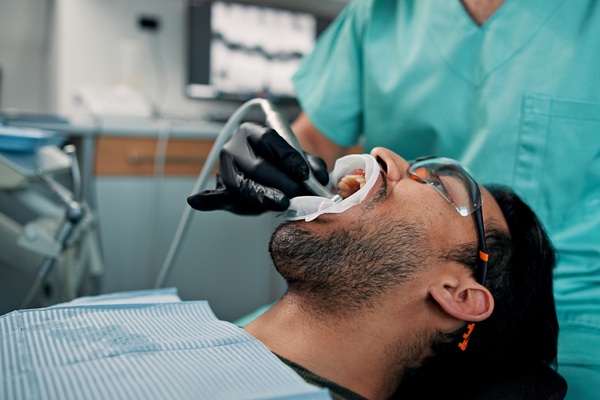How To Care for Your Teeth Between Dental Cleanings

Dental cleanings are an essential part of maintaining good oral health. However, there are other actions patients can take to maintain a healthy smile in between these visits. Brushing and flossing are a foundation of oral hygiene but are just a start. The following simple and practical tips can make for a healthier, more beautiful smile every month of the year.
Tips for maintaining healthy teeth between dental cleanings
A solid daily oral hygiene routine forms the foundation for keeping teeth clean and gums healthy, but additional steps can help enhance those efforts. Here are five tips to bolster oral health in between dental cleanings:
Drink water instead of soft drinks
Reducing or eliminating soda consumption helps protect both tooth enamel and overall oral health. Soft drinks contain acids and sugars that can erode enamel and encourage the growth of harmful bacteria. As a result, individuals who consume a lot of sugary sodas are at an increased risk of tooth decay.
In contrast, water helps neutralize acids, wash away food particles, and promote a balanced oral environment. Choosing water instead of sugary or acidic beverages supports healthier teeth. It also helps prevent dry mouth, a common contributor to chronic bad breath (halitosis) and bacterial growth.
Consider using mouthwash
Mouthwash is not a requirement in everyday oral hygiene. However, incorporating it can add a layer of protection against bacteria and plaque buildup. Antibacterial rinses help reduce the presence of germs that cause gum inflammation and cavities, while fluoride-containing options strengthen the teeth and promote remineralization. Mouthwash can also reach areas that brushing and flossing may miss, such as around the back molars or the gum line. Using mouthwash consistently between dental cleanings helps create a cleaner and fresher mouth and supports a robust hygiene regimen.
Chew gum after a meal
Chewing sugar-free gum can aid in oral health by stimulating saliva production. Saliva helps rinse away food debris, neutralize acid, and deliver minerals that support enamel strength. Gum sweetened with xylitol offers additional benefits by helping to reduce cavity-causing bacteria. While not a replacement for brushing or flossing, chewing sugar-free gum after a meal can help protect teeth, particularly if a toothbrush is not readily available.
Adopt a more tooth-healthy diet
A nutrient-rich diet supports stronger teeth and healthier gums. Foods high in calcium, phosphorus, and vitamins A and C contribute to enamel repair, tissue strength, and immune function. Crunchy fruits and vegetables like apples, strawberries, carrots, and celery help naturally scrub tooth surfaces and stimulate gum tissue. Limiting sugary snacks and processed carbohydrates reduces the fuel available to bacteria, lowering the risk of plaque buildup and decay between dental cleanings.
Quit smoking and other tobacco use
According to the Centers for Disease Control and Prevention, tobacco use can stain the teeth and increase the risk of gum disease. Both smoking and smokeless tobacco (i.e., chewing) can lead to gum recession, bone loss, and delayed healing after dental procedures. Quitting tobacco improves not only oral health but also overall well-being. There are many resources available to support those looking to quit. Dentists can help guide patients toward healthier alternatives.
Get oral health tips tailored to your needs
From making tooth-healthy dietary choices to reducing harmful habits, there are many actions that you can take to protect your teeth against cavities, gum disease, and discoloration. Make sure to get a dental cleaning every six months to ensure optimal oral health. Contact our Cumming office for more information or to schedule your next appointment today.
Request an appointment here: https://cummingsfamilydentist.com or call Cumming's Family Dentist at (770) 280-8723 for an appointment in our Cumming office.
Related Posts
It is a known fact that routine dental cleaning is an important part of oral health. The American Dental Association recommends that people with an overall healthy mouth visit a dentist for a regular checkup and cleaning once every six months. Those with specific dental issues or certain underlying health conditions may need to schedule…
Getting ready to make your dental cleaning appointment with your dentist? When combined with everyday oral care, routine cleanings help prevent cavities and gum disease.Even for patients who practice good oral care when at home by regularly brushing and flossing their teeth, it is still necessary to make routine cleaning appointments with a dentist. There…
A Dental Cleaning is a vital part of good oral hygiene. It is a preventative treatment that involves the dentist removing tartar and plaque from teeth surfaces. It is performed using a metal tool known as a scaler. Dentists recommend getting teeth cleaned at least two times each year, as it goes a long way…
Looking for dental cleaning information, specifically on oral health issues that regular dental cleanings can help prevent? If you are wondering just how important regular dental cleanings are when it comes to your overall oral health, know that they are extremely important.Even when you brush your teeth using a soft-bristled toothbrush at least twice a…
